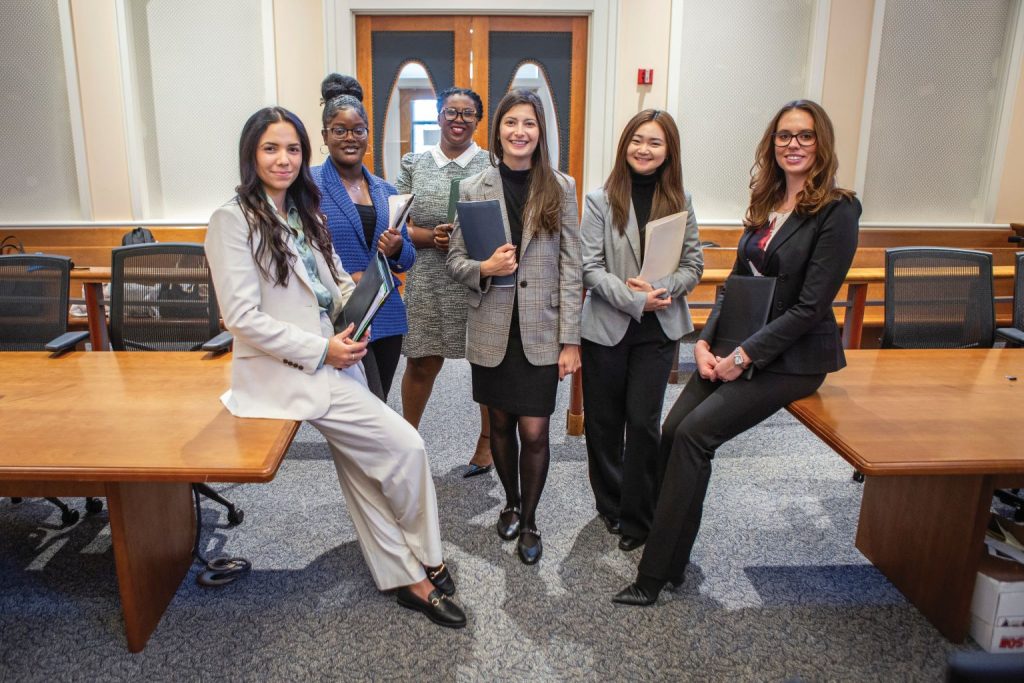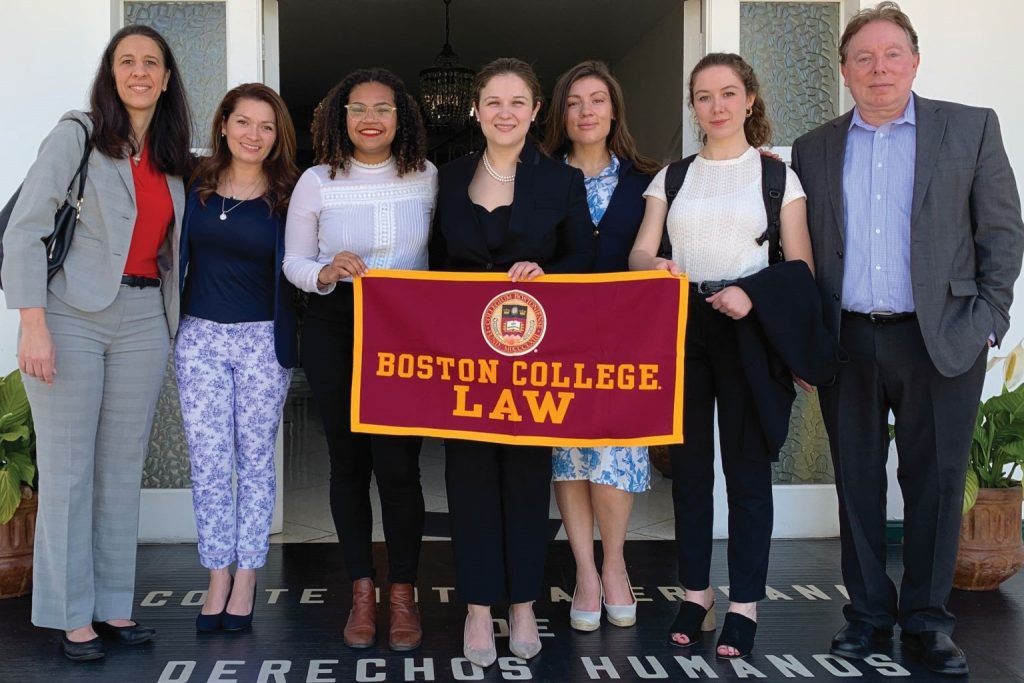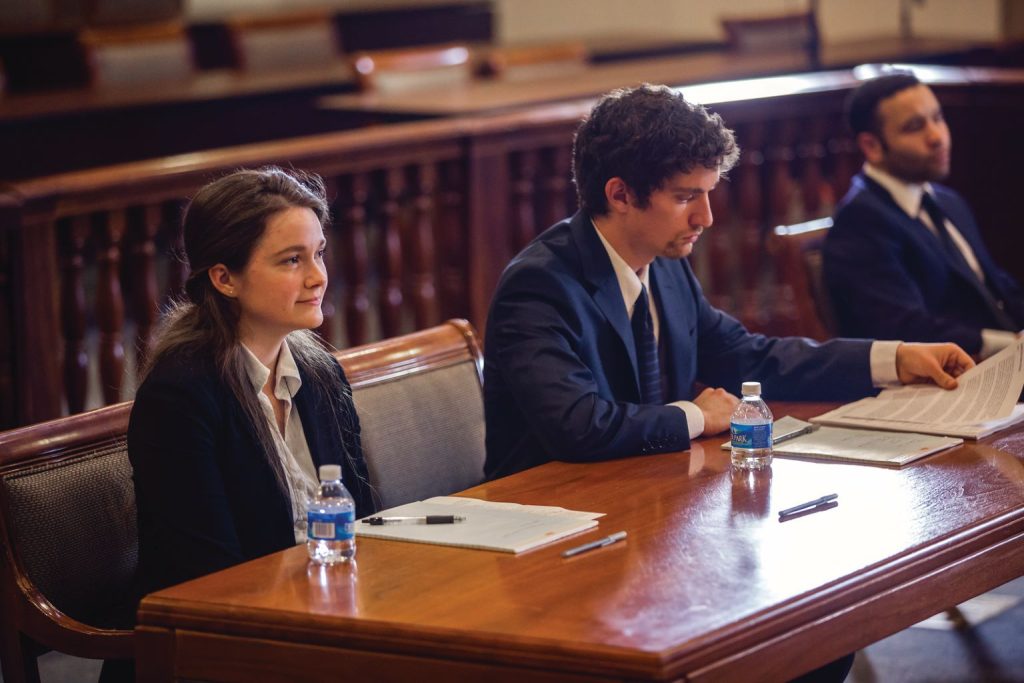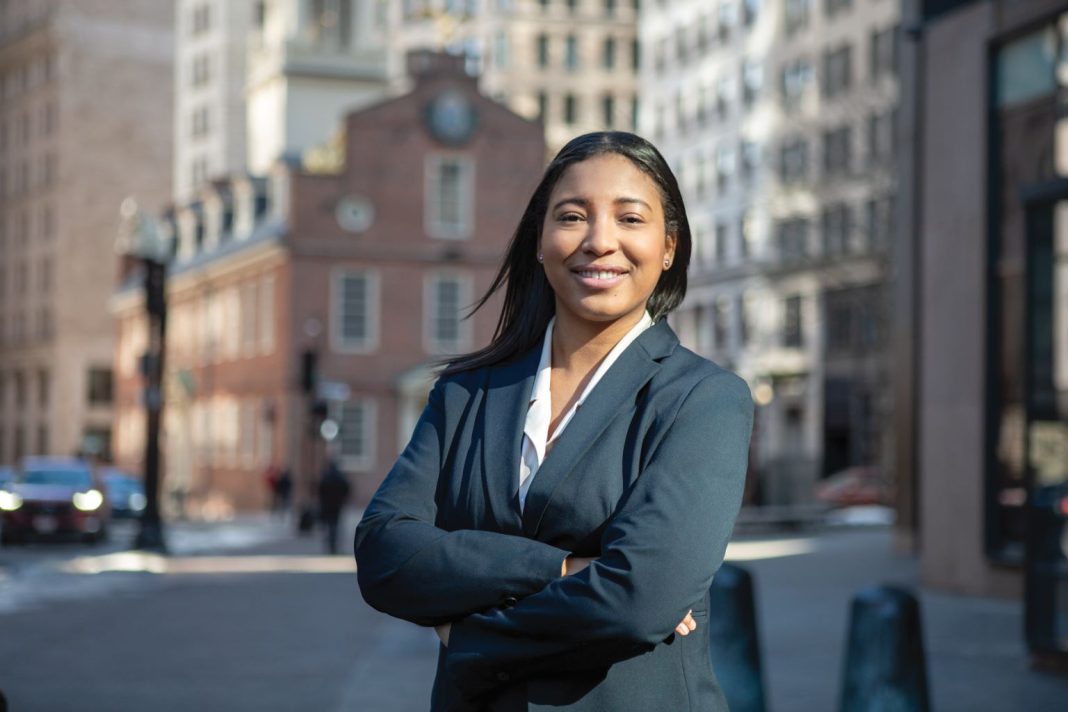Preparing students for practice is the signature goal of many law schools. We spotlight 64 schools that excel when it comes to providing hands-on, practical experience through clinics, externships and other offerings.
Tamia Hackworth’s legal superpower is not litigation.
Her interests lean toward understanding the finer details of contracts, proxy voting documents and non-disclosure agreements.
Hackworth, a third-year student at Northeastern University School of Law in Boston, said she was drawn to the school by the co-op opportunities offered in its Cooperative Legal Education Program.
“I’m completing my third co-op at BNY Mellon, a global financial services company, in the proxy voting and governance group,” Hackworth said. “The company invests in different ventures, and I like preparing the disclosures.”
Through Northeastern Law’s co-op program, Hackworth was able to test-drive her legal specialty and fine-tune her attention to detail for business documentation.
“I did some litigation work and researched cases early on and determined that practice area was not for me,” she said. “Knowing my strengths came from the hands-on work in each co-op, and at Northeastern Law, you do three.”
In the past few years, law schools have focused on the practical side of lawyering to prepare students to practice law, and every year preLaw highlights the schools that offer the best in practical training.
Northeastern Law topped the list this year. Its Cooperative Legal Education Program guarantees three full-time legal work experiences.
The school retakes the top spot in our ranking this year after coming in at No. 3 in 2024.
Hemanth Gundavaram, associate dean for academic and faculty affairs at Northeastern Law, said practical experience is a requirement to graduation.
“Northeastern Law gives students the opportunity to learn by doing,” Gundavaram said. “While other law schools might give students the chance to work over the summer or experience a part-time internship or externship, we integrate full-time employment into our curriculum.”
Other leading schools are Baylor University School of Law, which was second this year after being ranked No. 1 in 2024; University of St. Thomas School of Law – Minneapolis, which moved from second to third; University of California, Irvine School of Law, at fourth; and University of Denver Sturm College of Law at No. 5.
To determine our ranking, we looked at the number of students each school has participating in clinics, externships, simulation courses, moot court and other special programs. We gave the largest weight (32%) to clinics. We asked schools for the number of students who completed a clinic in the prior year. If a student was enrolled in a clinic for two semesters, that counted as two. Extra credit was given to schools that required clinic work.
For clinics, The University of Chicago Law School, UCI Law and Southern University Law Center take the top spots for highest percentage. Led by faculty, clinics provide a great opportunity for students to put classroom concepts into practice and network with legal professionals.
We looked next at externships. They account for 25% of the ranking. We asked schools how many students completed an externship in the prior year. Again, if a student had two externships, that counted as two.
Schools with strong externship or field placement numbers include University of St. Thomas, Northeastern Law and University of Denver Sturm College of Law.
Simulation courses account for 20% of the ranking. We asked for the total enrollment in such courses. If schools did not provide data, we relied on American Bar Association data, which shows the number of available positions in simulation courses.
Schools that top the list for simulation courses are Baylor Law, Pepperdine University Rick J. Caruso School of Law, Elon University School of Law, Capital University Law School and The University of Arizona James E. Rogers College of Law.
Moot court and pro bono hours account for 10% of our ranking. If a school requires pro bono hours, it receives extra credit. Regent University School of Law, Cornell Law School, Appalachian School of Law and Baylor Law scored high for moot court, and Northeastern Law, UCI Law and University of Denver stood out for pro bono hours.
Finally, 10% of the ranking goes to other practical training offerings.
Hackworth said she benefited from attending a law school that prioritizes hands-on experience throughout all three years.
She participated in the Community Business Clinic during the summer of 2023; completed a co-op at Liberty Mutual Investments in the fall of 2023; worked a co-op at the Paul Hastings law firm in the summer of 2024; and is doing a third co-op at BNY Mellon this spring.
“I have a post-grad offer with Paul Hastings, and I’m looking forward to learning from the firm’s esteemed attorneys while working on complex, high stakes matters that will sharpen my legal skills,” Hackworth said.
Best Schools for Practical Training
Scroll horizontally to see all columns. Filter by clinic guarantee / pro bono requirement. Click on a column with an arrow to sort by that column and click again to sort in reverse. You may also search the table, page through the results, and set how many items to show at a time.
Real-world from day one
In year one, each Northeastern Law student works with a nonprofit or government organization on an actual social justice project, not a simulation, as part of the Legal Skills in Social Context Program.
“This year-long program aligns 14 to 15 students, a professor and a teaching assistant with an organization that may not have the funding to work on an issue of legal importance,” Gundavaram said.
“This is a first-year clinical experience and a requirement to finish before moving to upper-level courses.”
The program oversees between 16 to 18 first-year projects each year.
“By working together on a social justice project, students are introduced to the core skills of effective team lawyering, putting into practice legal research for document creation, critical analysis and client representation,” Gundavaram said. “This practical training program has led to legislative and policy victories in which students have gained valuable experience.”

Northeastern Law students graduate having completed three professional, full-time co-op experiences, compared to maybe two internships at many other law schools.
“Students bring everything they learn from this experiential work into the classroom,” Gundavaram said. “This deepens the educational mission of our school by integrating skills and knowledge, allowing students to bridge the gap between theory and real-world application. This not only enhances their understanding of the law but prepares them to be effective leaders, advocates and problem-solvers in their communities.”
After year one, Northeastern Law students alternate between classrooms and co-ops until graduation.
“It’s our mission to find students the co-ops to meet the graduation requirement,” Gundavaram said. “Northeastern Law has more than 1,100 co-op employers in 40 states and co-ops completed in 55 countries. A student could clerk for a judge in Boston, assist lawyers in private firms in California and travel to France or Thailand for a global experience.”
Practical training in clinics provides students with an opportunity to explore diverse areas of law.
“The real-world training in our clinical program spans across issues involving immigration, domestic violence, prisoners rights, community business, public health, intellectual property and civil rights,” Gundavaram said. “Learning to interview clients, conduct legal research and work within deadlines are all practical skills that get better by doing the actual work and helping people in our community.”
The practical skills gained while in law school at Northeastern include simulations and practice courtrooms.
“Northeastern Law has upper-level courses designed to simulate different types of work, such as trial practice,” Gundavaram said. “It’s learning from lawyers the nuances of negotiating versus oral arguments or persuasion and being able to write a brief and analyze findings.”
Northeastern Law recently hired an assistant U.S. attorney to share the intricacies of the courtroom.
“He’s in court every single day, and he comes Friday afternoon to teach our students trial practice,” Gundavaram said. “We also have judges, negotiators and corporate leaders teach simulation courses where students play out scenarios in a mock trial or courtroom proceeding.”
The benefits of co-ops at Northeastern Law extend far beyond basic graduation requirements.
“Students are building bridges and creating alliances with each co-op, gaining practical skills to practice law and life skills to have a balanced work-life career,” Gundavaram said.
Benefits of interactive practice
Boston College of Law is new to our ranking this year. It earned an A-.
Claire Donohue, associate dean for experiential learning, joined BC Law in 2018 as an assistant clinical professor in the Center for Experiential Learning. Her teaching combines social work methodology and theory with legal theory and practice.
“Practical training for students is at the core of BC Law’s legal education,” Donohue said. “It’s critical to take what’s learned in the classroom and apply to real-world scenarios like those offered in a clinic or externship.”
Donohue said experiential learning presents dynamic scenarios in which students must think on their feet and navigate ethical dilemmas or changing facts.
“There’s a certain tension in the law, an interactive exchange between theory, ethics and practice,” she said. “At BC, law students begin building practice skills every semester, whether it’s a required class with a simulation component, moot court, mock trial, externship or a clinic.”
BC Law provides four types of legal education with an experiential component: curriculum offerings, clinics, externships and advocacy.
“Year one provides curriculum that becomes the foundation for the student’s journey to a J.D.,” Donohue said. “From required courses to electives, students begin understanding the law and professional responsibility.”
First-year students are introduced to critical perspective, constitutional law, contracts, criminal law, property and torts. They also take a law practice class, which introduces research, writing and advocacy as fundamental lawyering skills.
“1L students also have electives to choose from for an introduction into areas of legal scholarship or practice such as government oversight, human rights, mental health, negotiations and transactional law,” Donohue said.

IL students may also participate in a client counseling or client negotiating competition. 2L and 3L students can participate in clinics, externships and advocacy competitions such as mock trial and moot court.
“Mock trial is seen by many as a rite of passage in practical training for law students, with a simulated jury trial with fake jury, judge and litigants,” Donohue said. “Moot court is another practical-training ground where students make an oral argument in front of an appellate court, showcasing the application of the law to a given fact pattern.”
Students participating in externships benefit from doing the work of a lawyer while receiving guidance from licensed attorneys outside of the BC Law faculty.
“Students get their feet wet in the wild with externships with in-house counsel with the Boston Red Sox or at a law firm or government agency,” Donohue said. “The experience is paired with a classroom component about ethics, professional development and the rule of law.
“At BC Law, our clinics cover areas such as criminal defense, children’s rights, immigration, innocence, prosecution, community enterprise development and more” Donohue said. “Under attorney supervision, students can build the skills necessary to excel in their chosen area of law.”
Students in BC Law’s Innocence Program do research to secure the exoneration or release of wrongfully convicted individuals. Its civil rights clinic has sued the Massachusetts Department of Correction and made headway to improve confinement conditions. Its human rights clinic was asked to give oral comment on the intersection of human rights and environmental justice in front of an international tribunal in Brazil.
“Every student has a vision of the type of law they want to practice,” Donohue said. “It’s the school’s job to provide the environment to learn the practical skills and to gain confidence and competence. The ability to engage with practice during law school is a life raft of connection to the outside world so that students understand their calling to the law and can pursue what interests them the most.”
Culture of work
Regent Law moved up from a B+ in 2024 to an A- this year.
“One of Regent Law’s mottos is to develop students to be practice ready and purpose driven,” said S. Ernie Walton, associate dean of administration and admissions. “Students can choose from a variety of classes and practicums based on their desire, their unique calling.”
Walton said students wanting to be prosecutors may want to take the trial practice and prosecutor practicums. If the student’s dream is to be an appellate lawyer, then appellate advocacy and moot court would be good choices.
Practical skills classes are paired with clinics and practicums at Regent Law.
“The prosecutor practicum is one where students are paired with prosecutors at a Commonwealth Attorney’s office,” Walton said. “Law students learn the intricacies of the office, pretrial to trial, and the governing ethical rules.”
Regent Law also offers an immigration practicum where students work with a lawyer on actual immigration law cases.
Students in the legal aid clinic provide legal services regarding housing issues, access to benefits and domestic violence.
Students in the human trafficking clinic have advocated for a change in Virginia law to allow survivors of trafficking to have their criminal records cleared.
Regent Law Center for Constitutional Law gives students the opportunity to write briefs for constitutional cases before federal appellate courts and United States Supreme Court.
Students in the Center for Global Justice have worked on projects for human rights organizations all over the world, including writing memos on how to fight trafficking in Romania and drafting laws to protect children in Uganda.
“Students are doing actual legal work pro bono for clients of these centers,” Walton said. “They are on the front lines, seeing their work make a real difference.”

Practical training at Regent Law also includes moot court, trial advocacy and alternative dispute resolution.
“There’s a culture of work among our students as they prepare diligently for mock trial and moot court competitions,” Walton said. “They spend time drafting the motion; they ready themselves for the trial and the deposition; they develop the oral argument; and they learn from the professor’s critique and the experience.”
Walton said law school is not like medical school where a student has four years of residency.
“Law students need all forms of practical training to learn how to draft complaints, discovery documents or contracts in a low-pressure setting with feedback from legal professionals,” he said.
Walton shared a learning moment from his days as a Regent Law student. He was in a civil litigation class preparing for a mock deposition, and his approach was corrected by the practicing lawyer leading the course.
“The litigator stopped me and said, ‘Whoa, Ernie, you’re treating this as a cross examination when a deposition is a friendly sort of conversation where you’re building a rapport,’” Walton said. “I remembered this exact conversation when I did my first deposition practicing law. I learned by doing and receiving guidance to get it right moving forward.”
Walton said 51% of students’ success in lawyering is achieved through hard work, putting in the time, doing the prep and learning the “how to” so that writing the brief, arguing the rule of law or advocating for a client becomes part of their muscle memory.
This article appears in the Spring 2025 issue of preLaw magazine and includes a listing of the schools ranked A- and B+.

